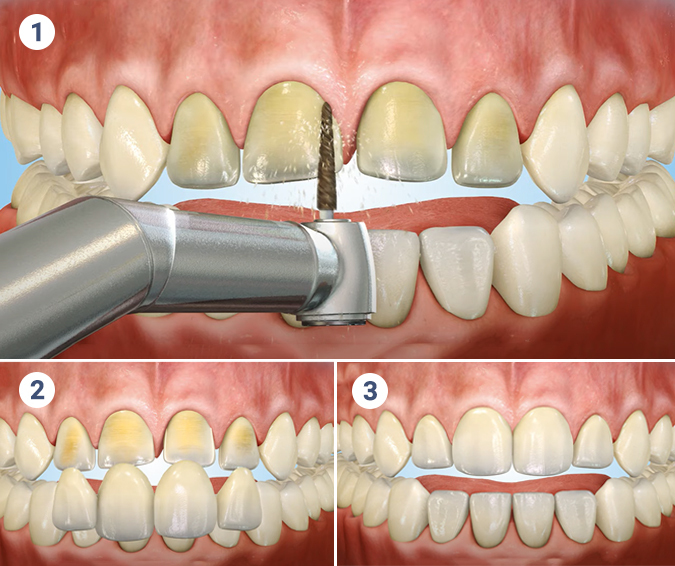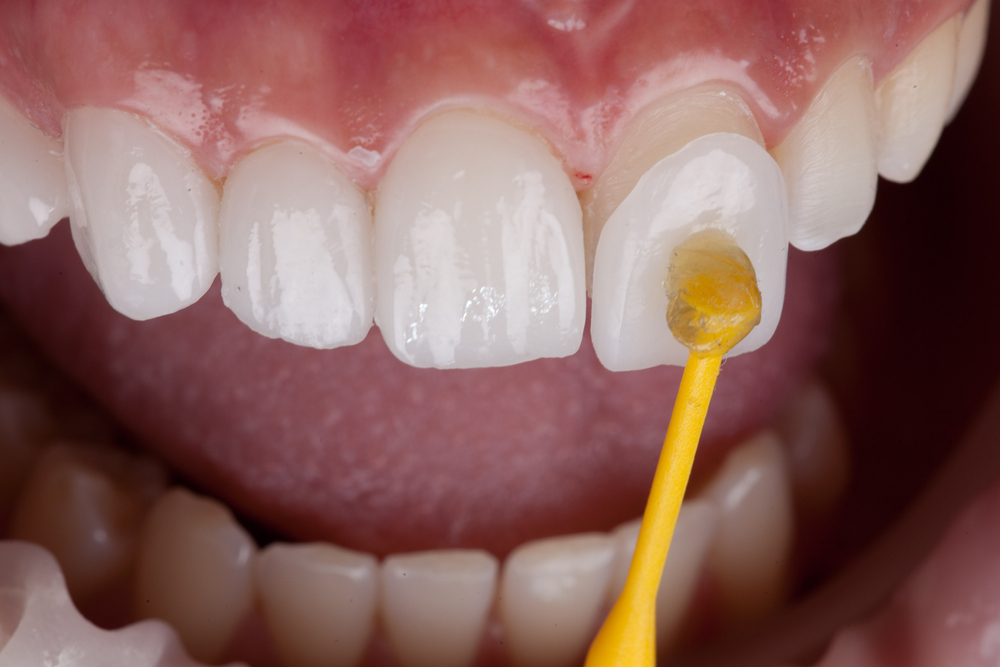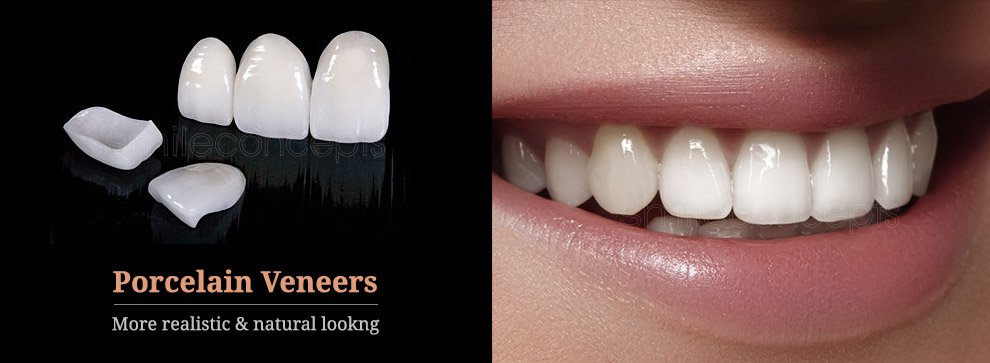Tips From Porcelain Veneers Dentist for a Seamless Procedure
Wiki Article
Opening the Tricks of Veneers: Facts, Types, and Advantages for a Lovely Smile
Veneers use an engaging solution for those seeking to improve their smiles. These dental improvements can attend to various flaws, from staining to misalignment. With choices like porcelain and composite, individuals can pick based upon their requirements and choices. Understanding the nuances of veneers, including application and treatment, is important. What aspects should one take into consideration prior to making a choice? The responses might shock those curious about this visual oral alternative.
Comprehending Veneers: What Are They?
Veneers are slim, personalized shells designed to cover the front surface of teeth, improving their look. Generally crafted from resilient products, these shells are tailored to fit each person's teeth precisely. They serve numerous purposes, including correcting visual blemishes such as staining, chips, or spaces. The application process involves a dental practitioner preparing the teeth, often by eliminating a percentage of enamel to assure a snug fit. When prepared, the veneers are adhered to the teeth making use of a strong adhesive.Clients commonly pick veneers for their capacity to create a natural-looking smile while providing a durable service to dental flaws. Unlike various other aesthetic dental care choices, veneers call for marginal intrusive treatments, making them a prominent selection. The outcome is an enhanced smile that can substantially boost an individual's self-confidence and self-worth. On the whole, veneers supply a reliable strategy to attaining an extra unified and appealing dental appearance.
Types of Veneers: Porcelain vs. Compound
When taking into consideration aesthetic oral choices, two main types of veneers stand out: porcelain and composite. Porcelain veneers are crafted from a durable ceramic product that resembles the all-natural appearance of teeth. They are known for their stain resistance and capacity to mirror light likewise to natural enamel, providing an aesthetic allure that lots of clients need. The application procedure usually entails even more preparation of the tooth structure and may need multiple sees to the dental expert.On the various other hand, composite veneers are made from a tooth-colored resin that is straight put on the teeth. This kind enables quicker application and can commonly be completed in a solitary browse through. While they are less costly than porcelain veneers, they might not provide the same long life or resistance to staining. Inevitably, the option in between porcelain and composite veneers depends upon individual choices, budget plan, and details dental demands.
The Benefits of Picking Veneers
Picking veneers provides countless benefits that can substantially enhance both the visual appeals and capability of an individual's smile. One of the key advantages is their capability to correct flaws such as staining, voids, and misalignment, leading to an extra uniform look. Veneers can also enhance the sturdiness of teeth, giving a protective layer that guards them from damages.Furthermore, they call for minimal tooth preparation contrasted to various other oral treatments, protecting more of the natural tooth structure. This conservation contributes to a healthier dental atmosphere while still accomplishing a stunning smile.
Veneers are highly adjustable, enabling people to pick the form, dimension, and color that ideal matches their choices. In addition, they are stain-resistant, making it simpler to preserve a brilliant and appealing smile over time. In general, veneers provide a reliable alternative for those seeking both aesthetic enhancement and long-term oral wellness benefits.
The Veneer Application Refine
The veneer application procedure includes a number of crucial steps to assure excellent outcomes. An examination is carried out to evaluate the client's needs, adhered to by the prep work and shaping of the teeth. Lastly, the veneers are bonded in position, with changes produced a perfect fit and look.First Appointment Steps
A complete preliminary assessment is important for any person taking into consideration veneers, as it sets the structure for a successful therapy. During this meeting, the oral professional examines the individual's oral health and wellness, discussing any existing issues that might impact the veneer application. This analysis may include X-rays and an aesthetic assessment to determine the problem of the gums and teeth.The dentist likewise involves the client in a detailed conversation concerning their visual goals, choices, and assumptions. They may provide different veneer alternatives tailored to the client's details requirements. Furthermore, the expert describes the treatment, potential dangers, and aftercare needs, ensuring that the client is comfortable and well-informed before continuing with the therapy.
Preparation and Forming Teeth
After the initial examination, the next stage involves the preparation and shaping of the teeth to accommodate the veneers. This important step is performed by the dental practitioner, who very carefully evaluates the tooth framework to determine the quantity of enamel that requires to be gotten rid of. Generally, a thin layer, typically around 0.5 millimeters, is cut off to ensure an appropriate suitable for the veneers. Accuracy is extremely important throughout this procedure, as it influences both the aesthetic outcome and the overall comfort. Once the teeth are sufficiently formed, perceptions are taken to produce custom-made veneers that line up completely with the person's oral account. This careful prep work establishes the phase for an effective veneer application, enhancing both look and feature.Bonding and Final Changes
Complying with the shaping and preparation of the teeth, the bonding procedure starts, marking a vital stage in the veneer application. During this stage, an oral adhesive is applied to the prepared tooth surface area, assuring a strong bond between the veneer and the tooth. The dental professional carefully places the veneer, making changes to accomplish the desired alignment and appearances. As soon as effectively put, a special light is made use of to cure the glue, solidifying the bond. After healing, the dental practitioner conducts final adjustments, trimming any type of excess product and fine-tuning the veneer's form to ensure an all-natural look. This careful interest to detail boosts both function and visual appeals, adding to a general gorgeous smile that is long-lasting and sturdy.Taking care of Your Veneers: Maintenance Tips
Taking care of veneers is necessary to maintain their look and longevity. A constant daily cleansing regimen, mindful evasion of staining foods, and routine dental exams are crucial elements of reliable maintenance. These practices help assure that veneers continue to be in peak problem and continue to improve one's smile.Daily Cleaning Regimen
On a regular basis maintaining veneers is vital for their long life and appearance. An appropriate day-to-day cleaning regimen can help protect their sparkle and prevent damage. Dental practitioners recommend brushing two times a day with a soft-bristled tooth brush and fluoride tooth paste, making sure that all surfaces are cleaned carefully to stay clear of damaging the veneer surface. Flossing day-to-day is additionally crucial to remove food particles and plaque from between teeth, where brushes may not get to. Additionally, using an antimicrobial mouthwash can assist preserve oral hygiene without hurting the veneers. It is suggested to stay clear of unpleasant cleansers and devices that can damage the veneer. By following these simple steps, individuals can keep their veneers looking gorgeous while promoting general oral health.Preventing Discoloration Foods
Although veneers are made to boost the look of teeth, their susceptibility to staining requires cautious dietary options. It is important for individuals with veneers to be conscious of particular foods and beverages that can result in staining. Dark-colored things such as coffee, merlot, and berry juices should be consumed in small amounts, as they are known to tarnish both all-natural teeth and veneers. Furthermore, acidic foods like citrus fruits can weaken the bonding representatives utilized in veneers, making them much more prone to discoloration. To preserve an intense smile, it is suggested to wash the mouth with water after eating discoloration foods and to practice normal dental hygiene. These thoughtful selections contribute significantly to the longevity and looks of veneers.
Routine Dental Examinations

Maintaining the integrity of veneers requires a commitment to normal oral examinations, as these visits play a crucial duty in guaranteeing their long life and look. During these brows through, dental specialists can analyze the problem of the veneers, looking for any kind of indicators of wear, damages, or underlying dental problems. Furthermore, routine cleanings aid get rid of plaque and tartar that can collect around the veneers, promoting overall oral wellness. Dentists can additionally supply tailored advice on treatment techniques and items matched for veneer maintenance. By adhering to a timetable of examinations, individuals can address possible troubles early, ensuring their smile continues to be vivid and attractive. Ultimately, normal dental visits are a critical part of veneer care.
Is Veneers the Right Option for You?
Determining whether veneers are the right choice typically depends upon private dental demands and visual goals. For those seeking to attend to issues such as discoloration, chips, or misalignment, veneers can provide a transformative remedy. Candidates generally consist of individuals with healthy and balanced teeth but want an improved smile.
Nonetheless, it is important to think about aspects such as tooth enamel condition, the degree of oral issues, and the desire to maintain veneers - Veneers Teeth. Consulting with a dental expert is essential, as they can assess dental health and determine if veneers are appropriate
Additionally, possible prospects must assess the long-lasting commitment, as veneers may need replacement every 10-15 years. Price factors to consider additionally play a substantial role, as veneers can be a substantial investment. Inevitably, the decision must be educated, stabilizing visual needs with practical factors to consider for lasting outcomes.
Regularly Asked Inquiries
How Long Do Veneers Typically Last Before Needing Replacement?
Veneers usually last between 10 to 15 years before needing replacement. Elements such as oral health, way of living selections, and worldly top quality can influence their durability, making routine dental check-ups important for maintaining their condition.Are Veneers Safe for Individuals With Delicate Teeth?
Veneers can be secure for people with sensitive teeth, however it commonly relies on the extent of level of sensitivity and the dentist's technique. Consulting an oral specialist prior to continuing is important to assure ideal outcomes.Can Veneers Be Eliminated or Changed Conveniently?

Do Veneers Discoloration Over Time, and Exactly How Can I Prevent It?
Veneers can discolor over time, particularly from foods and beverages like coffee or red white wine. To avoid staining, keeping good dental hygiene, making use of a straw for drinks, and regular dental cleansings are advised practices.What Is the Price Array for Obtaining Veneers?
The expense of veneers usually varies from $500 to $2,500 per tooth, relying on factors such as material type, dental expert experience, and area. People need to seek advice from dental experts for personalized quotes and funding alternatives.As soon as the teeth are properly formed, impacts are taken to develop customized veneers that line up perfectly with the patient's dental account. During this stage, an oral adhesive is applied to the ready tooth surface, assuring a strong bond in between the tooth and the veneer. It is important to take right into account elements such as tooth enamel problem, the degree of dental problems, and the determination to keep veneers. Veneers can be risk-free for people with sensitive teeth, yet it commonly depends on the seriousness of level of sensitivity and the dental professional's strategy. The cost of veneers commonly ranges from $500 to $2,500 per tooth, depending on variables such as material kind, dentist experience, and place.
Report this wiki page